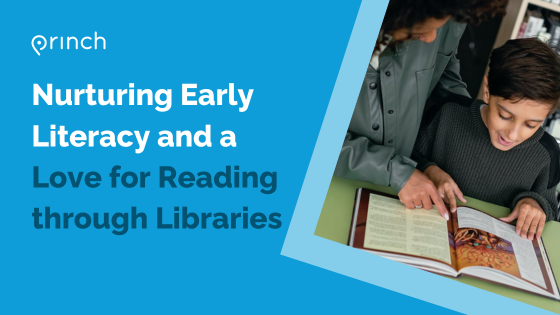Previously on the Princh Library Blog, we have covered how libraries can help both parents and babies. In this week’s post, guest writer Sam L. Bowman dives further into this topic, discussing how libraries can help with literacy specifically – one of, if not the, most important skills.
Critical Hubs for early literacy
Libraries are critical hubs that help the general public in numerous ways, but play a particularly important role in nurturing literacy, especially in younger generations.
According to UNESCO, 250 million children are failing to acquire basic literacy skills, and 763 million teenagers and young adults are also lacking in literacy. And a lack of literacy doesn’t just affect people when they are younger, it can negatively impact them throughout their entire life.
Lack of literacy skills can contribute to issues of poverty, impact the labor market, and have an overall negative effect on economic development once those children grow up and enter the workforce. Thus, children and teenagers can benefit greatly from the rich literacy experiences afforded by the special programs and events offered at libraries.
Learn the key aspects of Princh! Watch our on-demand demos at your convenience and see what makes Princh such a simple solution. Watch our demos here.
Why There Is Still a Need for Libraries
Libraries do so much more than simply provide people with access to books for reading. Libraries are essential to communities and to the education and growth of the people that live there.
Some of the many benefits that libraries provide include:
- Helping preserve and maintain history and knowledge of the truth;
- Free educational resources;
- Helping build and bring communities together through social events;
- Contributing to an increasing economy by offering access to technologies, tools, and resources for career development.
Libraries also provide an array of educational programs and services that help foster literacy. Furthermore, many libraries now function as community centers and gathering places. In short, libraries are safe spaces that are often welcoming to all individuals and provide them with the tools and supportive resources they need to better their lives.
Ways in Which Libraries Can Help Nurture Early Literacy
Reading offers a wealth of benefits but libraries do so much more than provide access to books. If improving literacy was simply a matter of providing people with books, then yes, there perhaps wouldn’t be a need for libraries. Many of these programs play a vital role in supporting the education and literacy of young people.
Youth-Friendly Library Design
Having a positive, supportive environment that encourages reading is crucial for today’s youth. Teenagers especially are reading less frequently, which could stem from a lack of a quiet and supportive space that is conducive to reading.
Libraries can help with this issue by creating reading spaces that are more attractive to younger generations. Many libraries already have children’s sections, for example, but they may lack spaces that appeal to older kids and teenagers.
Collaborations with Parents and Educators
Literacy programs offered at local libraries go a long way toward helping prepare children for school and supporting them through their studies. For example, many libraries partner with educators to provide programs and services that align with the local school’s educational goals and programs. This includes programs and support for summer reading, study and homework support, and teaching students how to use library media for research.
Libraries also collaborate with parents as well to promote and encourage reading and the use of other library services. In fact, according to Pew Research, 81% of parents say that libraries provide their children with information and resources that are not available in their home. As such, parents are more likely to support local libraries and encourage their children to go to the library to participate in their programs and utilize their services.
Storytime Events
Storytime events at libraries are a beloved tradition for many parents and their children. These events not only provide entertainment for parents and their children but also help instill a love of reading.
For example, some parents may struggle to interest their child in reading, but library story times turn reading into a fun and exciting event, which helps better encourage children to develop a love of reading. Those who perform the readings make the experience more entertaining, but also watching other children get excited about the book can help encourage the other kids to do the same.
Book Parties
In addition to providing a supportive environment that helps support literacy, library events can also be utilized to help build social connections between children and teenagers. Socialization helps build language and communication skills, promotes the importance of teamwork, and builds empathy.
So when libraries host certain events, they are both helping young people develop their love of books and literacy skills and helping them improve their social skills. Such events can include book fairs and parties with fun games that encourage learning and teamwork, such as book scavenger hunts, puzzle building, trivia games, and more.
Marketing the Library to Younger Generations
Though many local libraries already offer some of the programs and services mentioned above, it’s not uncommon for people in the community, especially young people, to be unaware of these events and programs. It is important for libraries to grow their marketing strategies to include generational marketing that appeals to all generations, young and old.
For example, a simple flyer handout in the neighborhood might work to attract boomers, but it’s not going to work on Gen Z. Newer generations are more heavily influenced by digital media and they have shorter attention spans, which means the way to their heart is through viral social media content with short entertaining videos that quickly grab their attention.
The good news is that you don’t need to be a major library with tons of money and resources to create social media marketing content. Marketing for smaller libraries is achievable with smarter strategies, such as using tools that help you automate content creation, scheduling your content ahead of time, and even repurposing and recycling existing content.
In Summary
Libraries do so much good and empower people in so many ways. They are especially vital to ensuring that younger generations continue to have access to the safe, supportive spaces and programs they need to help them build their literacy skills. They also offer young people a way to socialize while learning, which further helps them build the skills they need to grow into well-rounded adults who contribute to society and help grow our economy.
We will be back with another interesting article from the library world soon!
Want more insights from libraries across the world?
Subscribe to our blog to receive new library insights directly to your e-mail.
Sam L. Bowman
Sam writes about people, community, wellness and how they merge. He enjoys getting to utilize the internet for community without actually having to leave his house. In his spare time, he likes running, reading, and combining the two in a run to his local library.
Recent posts
Green Libraries: How Sustainable Design is Shaping the Future of Public Libraries
In this week's Princh Library Blog post, recurring guest writer Sam L. Bowman discusses an ever so important topic: sustainable design and [...]
Librarians Supporting Digital Literacy in the Community
In this week's Princh Library Blog, Nina Grant covers why digital literacy is important, the variety of ways in which librarians are supporting [...]
Libraries in Tropical Paradises
In this week's Princh Library Blog, recurring guest writer Nina Grant extends the summer just a little bit, by bringing us 3 [...]


